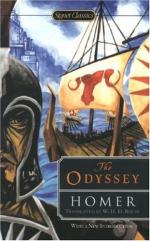“I had better send you my ideas about Nausicaa’s hanging of the maids (not ‘maidens,’ of whom Fronde wrote so well in his ‘Science of History’) before I forget it all. Luckily for me Liddell & Scott have specially translated most of the doubtful words, referring to this very place.
“A ship’s cable. I don’t know how big a ship she meant, but it must have been a very small one indeed if its ‘cable’ could be used to tie tightly round a woman’s neck, and still more round a dozen of them ‘in a row,’ besides being strong enough to hold them and pull them all up.
“A dozen average women would need the weight and strength of more than a dozen strong heavy men even over the best pulley hung to the roof over them; and the idea of pulling them up by a rope hung anyhow round a pillar [Greek] is absurdly impossible; and how a dozen of them could be hung dangling round one post is a problem which a senior wrangler would be puzzled to answer... She had better have let Telemachus use his sword as he had intended till she changed his mind for him.”
{179} Then they had all been in Ulysses’ service over twenty years; perhaps the twelve guilty ones had been engaged more recently.
{180} Translation very doubtful—cf. “It.” xxiv. 598.
{181} But why could she not at once ask to see the scar, of which Euryclea had told her, or why could not Ulysses have shown it to her?
{182} The people of Ithaca seem to have been as fond of carping as the Phaeacians were in vi. 273, etc.
{183} See note {156}. Ulysses’s bed room does not appear to have been upstairs, nor yet quite within the house. Is it possible that it was “the domed room” round the outside of which the erring maids were, for aught we have heard to the contrary, still hanging?
{184} Ulysses bedroom in the mind of the writer is here too apparently down stairs.
{185} Penelope having been now sufficiently whitewashed, disappears from the poem.
{186} So practised a washerwoman as our authoress doubtless knew that by this time the web must have become such a wreck that it would have gone to pieces in the wash.
A lady points out to me, just as these sheets are leaving my hands, that no really good needlewoman—no one, indeed, whose work or character was worth consideration—could have endured, no matter for what reason, the unpicking of her day’s work, day after day for between three and four years.
{187} We must suppose Dolius not yet to know that his son Melanthius had been tortured, mutilated, and left to die by Ulysses’ orders on the preceding day, and that his daughter Melantho had been hanged. Dolius was probably exceptionally simple-minded, and his name was ironical. So on Mt. Eryx I was shown a man who was always called Sonza Malizia or “Guileless”—he being held exceptionally cunning.



